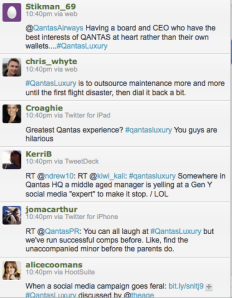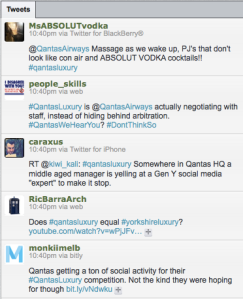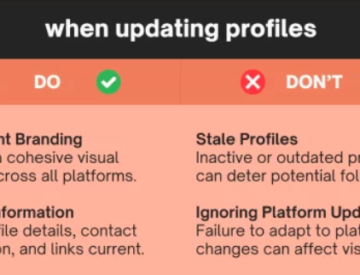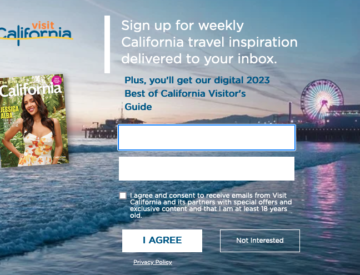It’s the talk of the town on the twittersphere, and it’s compliments once again from our friends down under at Qantas airlines. On November 22, the Qantas PR team operating the @QantasAirways twitter handle sent out a call to tweet for a chance to win a pair of pyjamas, amenities and first class gift pack. All you had to do is include the hashtag #QantasLuxury in your tweet to enter the contest, while describing what was your definition of luxury experience on-flight.
The original intent was good, and it was part of “their ongoing social media strategy”. But perhaps a little context is required here to understand that the timing for this kind of campaign was horrible, to say the least.
When the past comes back to bite you
Rewind in time to a year ago in November 2010, and Qantas was at the centre of PR disaster that involved one of its brand new A380 aircrafts rumored to have exploded during a flight to Singapore. There was talks of a crash, even pictures of parts found in the ocean circulating on the web. Tweets were flying and Qantas was slow to react, which they eventually did via their Facebook page.
It was through this incident, however, that the airlines (along with the rest of the industry) realized the real-time power and need to be on Twitter in order to properly handle this type of situation. A full account of this episode can be found in this article on tnooz by clicking here.
Then, earlier this year in February, Qantas CEO Alan Joyce blamed Twitter for the company’s share price collapse in the weeks following the events in Singapore. This showed very little empathy towards the situation and distress it caused to passengers and employees alike, not to mention the fact it was putting the blame on social media rather than looking at how the company could have handled the situation better and differently.
Context matters
All of this, of course, compares to nothing with the negotiations and industrial disputes that have been plaguing the airline during the past few months with three employee unions, generating tremendous negative publicity that even led to a grounding halt of the entire Qantas fleet on October 29, less than a month ago.
Still today, an agreement has not been reached and it is said that Qantas management walked away from talks with the Transport Workers Union and Australian and International Pilots Association yesterday. The same day the contest for #QantasLuxury was launched.
Knowing the context thus sheds a different light on the initiative, doesn’t it?
Social Media campaigns should not live by themselves, just like most marketing campaigns need to be aligned with corporate objectives. In this specific case, the initiative showed a blatant lack of consideration for what consumers have been going through in past weeks and months. You can see some of the comments in the screen shots, but they only capture a fraction of the twitter frenzy this campaign sparked. For a pair of pyjamas? Sheesh, if at least they were offering a free trip in first class…
The question now: how could this situation have been avoided? Qantas will certainly need to look at how their social media management is set up, but is your organization also at risk of living a similar situation?










Leave a Reply